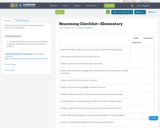
A checklist used by teachers to assess elementary students’ reasoning skills.
- Subject:
- English Language Arts
- History
- Life Science
- Mathematics
- Physical Science
- Social Science
- Material Type:
- Assessment
- Date Added:
- 07/03/2017

A checklist used by teachers to assess elementary students’ reasoning skills.
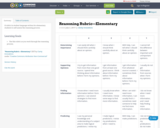
A rubric in student language written for elementary students to self-assess the reasoning process.
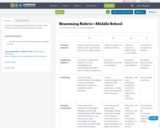
A rubric in student language written for middle school students to self-assess thinking while reasoning.
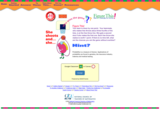
Your basketball team is down by one point! Your teammate, who makes free throws about three-fourths of the time, is at the free-throw line. She gets a second shot if she makes the first one. Each free throw she makes is worth one point. If there is no time left, what are the chances you win the game without overtime?

With educators from around the world and faculty from MIT and Stanford University, you will learn quick and effective practices for evaluating online information that you can bring back to your classroom. The Stanford History Education Group has distilled these practices from observations with professional fact-checkers from the nation’s most prestigious media outlets from across the political spectrum. Using a combination of readings, classroom practice lessons, and assignments, you will learn how to teach the critical thinking skills needed for making wise judgments about web sources.
At the end of the course, you will be better able to help students find reliable sources at a time when we need it most.
This course is part of the Open Learning Library, which is free to use. You have the option to sign up and enroll in the course if you want to track your progress, or you can view and use all the materials without enrolling.
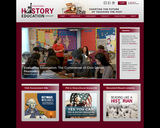
Read about our new research on civic online reasoning in Sam Wineburg and Sarah McGrew's read more »